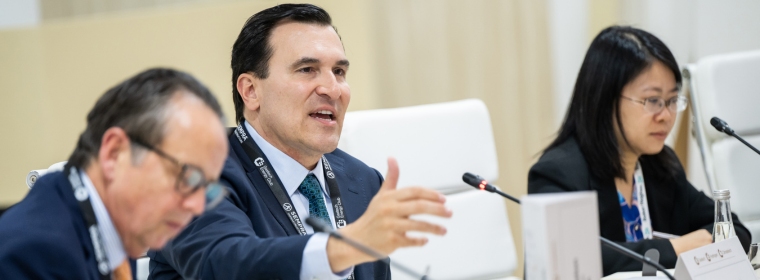Accelerating Japan’s energy transition through innovation and global connections
Leadership Roundtables
The invitation-only Leadership Roundtables will act as an important cornerstone of the Japan Energy Summit & Exhibition's programme, bringing together C-level industry executives, and policymakers for closed-door conversations that will address, debate, analyse the latest trends impacting the energy market in Japan and beyond. These aim to generate thought-leadership and insights required to drive real progress towards net-zero.
The Leadership Roundtables will be held under the Chatham House Rule to facilitate open conversation and information sharing, enable networking, and open doors to relationship building.

Why attend?

Leadership Roundtable Sessions
Roundtable One: Rebooting Asia’s Energy Transition
3 June 2024, Monday, 13:30 - 15:00
The global economy still runs on fossil fuels, with COP28 last November revealing that no major country is on track to meet its commitment to a Paris-aligned pathway of 2 °C or lower. On top of that, all governments continue to prioritise energy security in an uncertain world. The desired low-carbon energy system that the world wants, and that would eventually enhance energy security, will take years to roll out. It will also be expensive. Capital-intensive technologies – such as green hydrogen and carbon capture, utilisation and storage (CCUS) – are not commercially viable today without hefty subsidies. Higher interest rates have further eroded the economics.
Currently, most governments have little appetite for the policy action and investment needed to accelerate the transition. The EU and UK governments have already pushed back some 2030 goals and cost of the transition is likely to feature in the multiple elections around the world this year. All eyes are on November’s US presidential election and whether support for new technologies through the Inflation Reduction Act will be maintained.
Asia Pacific is no exception. Across the region, countries are locking in new fossil fuel supply to boost energy security. With carbon emissions rising, there is a strong case for Asia to reboot its net zero ambitions. Addressing Asia’s demand for coal is an important first step. Gas can play a key role, but not without significant levels of investment to underpin supply and develop infrastructure. Can policy makers deliver the fresh thinking need to revitalise the goal of decarbonising conventional energy supply, boost investment in clean energy technologies and critical minerals and implement supportive carbon policies?
3 June 2024, Monday, 16:00 - 17:30
As governments across the world grapple with the energy trilemma of security, affordability and sustainability, energy policymakers have doubled down on policies that best serve their nation’s interest. Ongoing conflicts, high inflation, supply chain disruptions have further added to the uncertainty. In such an environment, forecasting global energy balances and in particular Gas/LNG (as a transition fuel) becomes a complex exercise.
Wood Mackenzie’s latest Strategic Planning Outlook forecasts LNG supply growth of 200Mtpa by 2030, equal to around 50% of the current market. While this surge in supply, led by the US and Qatar, will ensure LNG availability and affordability through the second half of the decade, more supply is still required. The recent pause on US LNG project approvals and rising challenges to financing new supply as the energy transition gathers pace could significantly tighten the market by 2030.
With European demand expected to decline over the next decade, all eyes are on Asia’s gas markets. Regional dynamics are already coming into play. The mature markets of Japan, South Korea and Taiwan are forecast to have flat demand with downside risks and while China’s LNG imports continue to grow, these are expected to peak by as early as 2032. South Asia and Southeast Asia are the longer-term prize; however, challenges remain on price affordability, infrastructure, investments, speed of decision making and forex reserves/currency depreciation.
4 June 2024, Tuesday, 13:30 - 15:00
As governments continue to target net zero, renewables and storage, low-carbon hydrogen and ammonia and carbon capture and storage (CCS) are being heralded as key enablers of future energy security and decarbonisation for the mature economies of Asia.
LNG can play a key role in facilitating the growth of low-carbon energy across the region. For renewables, LNG is already proven as providing the grid stability to balance intermittent solar and wind generation. For Northeast Asia’s future low-carbon hydrogen and ammonia markets, the slow pace of development in the green hydrogen sector – produced from water using electrolysers powered by renewables – offers opportunities for blue hydrogen manufactured in Asia from imported LNG to emerge as a credible alternative to green, produced using CCS to cut carbon dioxide emissions. South Korea is already exploring opportunities in this area and others may follow. By doing so, Asia’s LNG importers will be able to utilise existing LNG infrastructure, expertise and contracts and reduce the need to ship large volumes of hydrogen by sea. Instead, capturing carbon and shipping it, either domestically or overseas, is emerging as a lower cost option and potentially a new business opportunity for local players.
LNG continues to be essential to the economies of Northeast Asia, but its role is changing as demand slows and low-carbon energy proliferates. But for how long can LNG be a transition fuel for the growth in renewable? Could manufacturing blue hydrogen from imported LNG via CCS transform the long-term demand outlook across Northeast Asia, pushing importers to continue engaging with producers, portfolio players and traders to secure new supply? And can LNG act as the facilitator of future low carbon energy in Northeast Asia?







